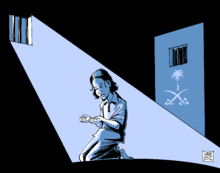Hamza Kashgari
Hamza Kaschgari (also Hamsa Kaschghari , Arabic حمزة كاشغري, DMG Ḥamza Kāšġarī ; full name: Hamza Kaschgari Muhammad Nadchib ; * 1989) is a Saudi author and former columnist for the daily newspaper al-Bilad . He became known worldwide after he was extradited from Malaysia to Saudi Arabia on February 12, 2012 for three tweets critical of Islam .

Political commitment
Kashgari publicly supported the so-called Arab Spring and, according to the Malaysian NGO Lawyers for Liberty, was active in a group to support the Arab Spring.
When hundreds of people protested against the poor infrastructure in Jeddah on January 29, 2011, killing 11, Kashgari criticized the authorities' reaction in his public letter for al-Bilad .
Kashgari became known worldwide after he published three statements critical of Islam in February 2012, and then fled to Malaysia , from where he was extradited to Saudi Arabia. On February 4, 2012, on Mawlid an-Nabi , a Muslim holiday in honor of the Islamic prophet Mohammed , Kashgari expressed his position on the founder of the religion in three tweets.
The entries say:
- “On your birthday I will say that I loved the revolutionary in you who always inspired me. But I don't like the halo. I do not adore you. "
- "On your birthday, I see you wherever I look. I loved certain aspects of you, hated others and didn't understand many."
- "On your birthday I will not bow to you or kiss your hand. Instead, I will shake it like my peers do. And I will smile at you as you smile at me. I will speak to you like a friend and not different."
Kashgari's fictional conversation with the Prophet sparked a wave of protests. After a high-ranking committee of Islamic clergy declared him an “infidel”, Kashgari fled to Malaysia , where he was arrested on arrival at Kuala Lumpur airport - allegedly on the basis of an arrest warrant issued by Interpol - and extradited to his homeland without trial. Despite opposition from human rights organizations and lawyers, the Malaysian authorities anticipated a postponement of the deportation, apparently to please Saudi Arabia .
Interpol's role in the arrest of Kashgari has been criticized by the British non-governmental organization Fair Trials International (FTI) as an abuse of their powers. Interpol must respect the human right to freedom of expression and refrain from any involvement in political or religious cases. For its part, Interpol claims that it has not issued an arrest warrant. In the case of a so-called “red notification” (arrest with the aim of extradition), the independent Commission for the Control of Interpol's Files (CCF) examines whether the request violates the principle of non-interference in political and religious questions.
Hamza Kaschgari was detained for almost two years by the Saudi authorities for these three entries without trial.
Thousands of Muslim users had called for the punishment and death of Kashgari via the social networks Facebook and Twitter .
The Egyptian Grand Mufti Ali Gomaa defended Hamsa Kaschgari from his critics and called for a dialogue about the possibilities offered by social networks.
Amnesty International and Facebook groups tried to prevent the conviction of Kashgari with public protests and petitions around the world. The European Union also condemned his deportation and called for all measures to be taken that led to a positive result. Kashgari was released from prison at the end of October 2013.
Web links
- Sophie Mühlmann; Christoph Sydow: Against freedom . Welt Online , February 14, 2012.
- "Saudi Writer Is Deported Over Posts on Prophet" , New York Times , February 12 2012th
Individual evidence
- ↑ "The Saudi Journalist Hamza Kashgari: Satanic Tweets" , in: Near and Middle East (Blog), February 9, 2012. Date of retrieval: February 13, 2012.
- ↑ Matthias Kremp: Three Twitter messages - already threatening the death penalty . Spiegel Online , February 10, 2012.
- ↑ Controversial Tweets. Malaysia extradites Mohammed doubters to Saudi Arabia . Spiegel Online , February 12, 2012.
- ↑ “Interpol accused after journalist arrested over Muhammad tweet” , in: The Guardian , February 10, 2012. Date of retrieval: February 13, 2012.
- ↑ “Why 21,000 Facebook users are demanding the death of a Saudi” , in: Süddeutsche Zeitung , February 13, 2012. Query date: February 14, 2012.
- ↑ “Interpol washes hands in innocence” , in: Telepolis , February 14, 2012. Date of query: February 14, 2012.
- ↑ a b “Blogger should die because he does not worship Allah” , in: Die Welt , February 13, 2012. Query date: February 13, 2012.
- ↑ 26,000 people claim the death of a journalist . Augsburger Allgemeine, February 16, 2012
- ↑ "Grand Mufti calls for dialogue about the internet" , in: The National (Abu Dhabi), February 20, 2012. Query date: February 22, 2012.
- ↑ SaveHamzaKashgari ( Memento of the original from February 22, 2012 in the Internet Archive ) Info: The archive link was inserted automatically and has not yet been checked. Please check the original and archive link according to the instructions and then remove this notice. on Facebook
- ↑ Saudi journalists face the death penalty . European Parliament, press release of February 13, 2012
| personal data | |
|---|---|
| SURNAME | Kashgari, Hamza |
| ALTERNATIVE NAMES | حمزة كاشغري (Arabic); Kashgari, Hamza; Kashgari Mohamad Najeeb, Hamza; Kāšġarī, Ḥamza |
| BRIEF DESCRIPTION | Saudi author and columnist |
| DATE OF BIRTH | 1989 |
